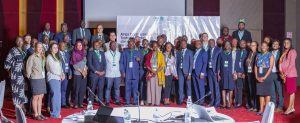AfDB partners Global Centre on Adaptation to enhance Africa’s capacity for climate adaptation funding
December 7, 2022498 views0 comments
By Onome Amuge
The African Development Bank (AfDB) and Global Center on Adaptation have launched a new initiative under the technical assistant programme of the Africa Adaptation Acceleration Programme aimed at helping African countries access more climate adaptation funding.
Read Also:
- Kenya tops Africa in venture capital funding as Nigeria loses dominance
- No respite in ‘Corporate Exodus’ from Nigeria’s business climate
- Pepsodent partners schools to deepen awareness on oral health
- Nigeria’s agric research at risk over debt obligations to international partners
- Africapitalism champ, Tony Elumelu joins IMF Advisory Council to drive…
The launch event for the programme took place recently in Abidjan, Cote d’Ivoire, with program partners including the Green Climate Fund (GCF), World Meteorological Organisation (WMO), Africa Climate Change Fund, ClimDev Special Fund and regional Climate Centers in Africa.
Through this new initiative, direct access entities in Africa are expected to receive additional support to enhance their capacity with regards to climate data, tools, and methodologies that help them meet the critical requirements of climate rationale for compelling funding proposals that could merit approval by the board of the Green Climate Fund (GCF).
The GCF is one of the mechanisms of the United Nations framework convention on Climate Change to significantly contribute to the global efforts towards attaining the goals set by the international community to combat climate change. It supports developing countries to limit or reduce their greenhouse gas emissions and adapt to climate change impacts. For adaptation, it allocates resources based on the ability of a proposed activity to demonstrate its potential to adapt to the impacts of climate change and the urgent and immediate needs of vulnerable countries.
 Based on this, the African Development Bank and the Global Center on Adaptation, said they will work with their partners to select at least four proposals each year based on the pipeline of direct access entities funding proposals that require additional technical assistance and guidance. The Global Center on Adaptation also disclosed that it will provide technical assistance for a selected set of funding proposals through its Technical Assistance Programme (TAP).
Based on this, the African Development Bank and the Global Center on Adaptation, said they will work with their partners to select at least four proposals each year based on the pipeline of direct access entities funding proposals that require additional technical assistance and guidance. The Global Center on Adaptation also disclosed that it will provide technical assistance for a selected set of funding proposals through its Technical Assistance Programme (TAP).
23 Direct Access Entities accredited or at the final stage of accreditation to GCF participated in the two-day event held between December 6-7, with representatives of regional and international accredited entities, including the Development Bank of Southern Africa, the International Fund for Agricultural Development, the West African Development Bank, the Africa Finance Corporation and the United Nations Environment Programme.
In his opening remarks, Anthony Nyong, senior director for Africa at the Global Center on Adaptation, noted that the new initiative aims to significantly increase the flow of adaptation finance to Africa.
“Given the central role of the Green Climate Fund, the unprecedented volumes of funding it offers, the range of financial instruments it provides, and its different access modalities, we will initially focus this initiative on accessing GCF resources, but this is just the start of our long-term partnership with African countries to mobilise finance for climate adaptation across the continent,” Nyong said.
Al Hamndou Dorsouma, acting director of the Department of Climate Change and Green Growth at the African Development Bank, said: “climate rationale for GCF funding proposal is like the foundation of a building. A solid building should have a solid foundation and I am glad our bank has forged collaboration with relevant regional and international institutions to help direct access entities secure approvals for more funding proposals on adaptation with strong climate rationale.”
On his part, Kevin Horsburgh, lead climate scientist representing GCF, explained that to promote transformational projects and catalyze climate finance at scale, GCF follows a four-pronged approach, including; transformational planning, catalyzing innovation, de-risking high impact projects,and aligning finance with sustainable development.
According to Horsburgh, each step needs the best available information to assist decision-making. He added that the GCF is pleased to be working with the World Meteorological Organisation to create the bridge between climate information and all those who need to use it, to improve access to climate finance.
Also speaking,Amir Delju, Senior Scientific Officer with the World Meteorological Organisation, emphasised that effective and progressive response to the urgent threat of climate change should be based on the best available scientific knowledge.
“We recognise that it is very challenging for least developed countries to meet this requirement. As an expert service provider, WMO will continue providing the full value cycle of climate services, from data to analysis, information production, interpretation of the findings, and expert advice,” he added.
